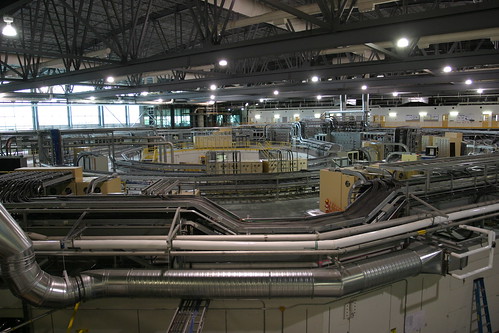Hey internet,
I know most chemistry undergrad programs don't leave a ton of wiggle room for electives, but even if you find history to be not your cup of tea you should totally know about Lise Meitner!
Here are seom fun facts about Meinter:
1. She was a bad-ass physicist at a time when women were not allowed to get doctorate degrees, not viewed as capable of doing serious research and not able to hold a professorship (she worked for free as a "guest" until the age of 35-- sounds a lot like a really long, sexist postdoc).
2. She discovered the Auger effect in 1923. Coincidentally, Pierre Auger didn't discover the Auger effect until 1925, which is kind of funny given that they're named after him and everything.
3. She then teamed up with Otto Hahn to discover nuclear fission.
4. I'm going to repeat that: She helped friggin discover nuclear fission. Dudes!
4a. The way they discovered it was pretty dang clever, the perfect mix between chemistry and science. In studying the bombardment of uranium with neutrons, Hahn discovered the formation of barium via the formation of a organic barium salt. However, it was Meitner (and her nephew Otto Frisch, who coined the term fission and would go on to work at Los Alamos) who came up with the theoretical explanation for what was going on. She also realized this was in accordance with Einstein's famous E=mc^2, helping provide experimental proof for this most famous equation.
5. She also happened to do all this while on the lam from Nazi Germany, meeting covertly with Hahn, who stayed in Germany for the most part.
5a. As you may know, the discovery of fission led to the establishment of the Manhattan project and, um, atomic bombs. Meitner was offered a role working on the project but refused to work on a project with destructive intentions.
6. Hahn would go on to win the 1944 Nobel prize in Chemistry for the discovery, conspicuously without sharing any credit with Meitner. Sadly, Hahn never did fully acknowledge her role in the discovery of fission. Jerkwad. Hahn wasn't a total tool; he did help Meitner flee Nazi Germany by giving her a diamond ring to use as a bribe, and the initial reason he was not able to acknowledge her role in the initial publications was political, as a coauthorship would have admitted he was collaborating with a jewish refugee to the Nazis. But, anyway, he (and the Nobel committee) still comes off as a bit of a dink (collective dinks) for failing to give credit where credit was clearly due.
This concludes the history of chemistry lesson for today! Hope you enjoyed it!
Sunday, April 4, 2010
history!
Subscribe to:
Post Comments (Atom)

4 comments:
I'm just going to call them Meitner electrons from now on.
i quite enjoyed that history, despite my aversion to chemistry. hey, remember when you cried during "the perfect man"?
you NEEEED to see "Einstein's Gift". It is seriously all about this.
hmm, i am having second thoughts about that definitive statement. let's just say it's all about science and that you might like it, but further investigation is required.
Post a Comment